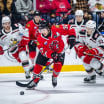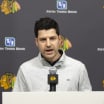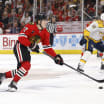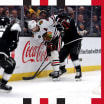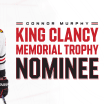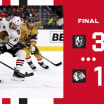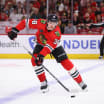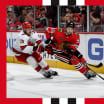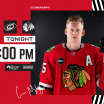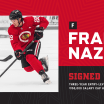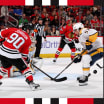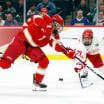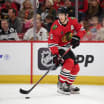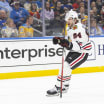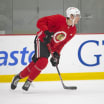Stan Bowman
knows that some of the decisions he makes in an effort to improve the Blackhawks will work and some will not.
The Blackhawks Senior Vice President/General Manager also knows that coming with the territory is each of the moves will be scrutinized by fans and media - sometimes fairly and sometimes unfairly.
Bowman hasn't had a forum to explain in detail his rationale behind his thinking - until now. Leading up to and throughout the 2019-20 season, Bowman will sit down with Blackhawks Senior Writer Chris Kuc and explain why he does the things he does and perhaps clear up any misconceptions along the way. Bowman doesn't know what questions are coming and opened this first discussion with, "Ask me anything."
In Pt. 1, Bowman gives his reasoning behind wanting fans to get the full story, why he chose Kirby Dach over other top prospects with the No. 3 selection in the NHL Draft, defends Brent Seabrook's contract and reveals how the Blackhawks' biggest needs for the 2019-20 season were pinpointed.
Sessions with Stan: Offseason Building, Pt. 1
SVP/GM Stan Bowman opens up on the NHL Draft, Seabrook's contract and building the 2019-20 roster
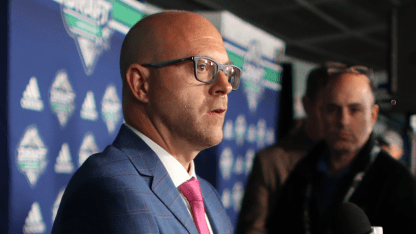
Coming Friday will be Pt. 2 in which Bowman lays out his game plan for retooling the roster, his thoughts on making trades vs. free-agent signings, managing the NHL's salary cap, an optimistic lunch with Patrick Kane in Slovakia and why the 2019-20 season will be perhaps the most critical of his tenure as GM.
But first, Pt. 1:
KUC: Let's start with an easy one: Why is it important to you to answer these questions so fans can get a sense of how you go about things?
BOWMAN: There are layers to the decisions we make. They aren't all right, but they are all well thought-out and we have a lot of forethought and a lot of detailed study when we want to look at a player. It's not just what is his stat line from last year. It's all the underlying things like how our scouts spend a lot of time looking at a player, what we look at on video and how we look at the analytics. It's hard to communicate all of that but if you and I can do a little bit better job giving some context then I think maybe the fans would understand a little bit better what we're doing and why we're doing it. That's kind of the goal for me.
I've always wondered how much attention you pay to criticism from media and fans. Does it bother you when you see people with misconceptions of how you arrived at your decisions?
Well, I think it's partially a sign of the times. The world we live in now is full of snap judgements - it's quick decisions, it's soundbites, it's Twitter posts. There's usually a lot that goes into decisions that we make and there are a lot of factors that don't get highlighted in the media because there is a lot of nuance to them. As a result, there's sort of limited information and people make quick judgements which seem to make sense, and I accept that that's how it is. I just move on from it. I can't get bogged down with it because that happens often, not just to the Blackhawks. All I can do is try when I have the opportunity to give some context as to why we do what we do. We still get things wrong. We do make mistakes but the decisions we make have reasoning behind them. I think sometimes that doesn't get a light shined on it. Now, the reasoning doesn't always work and that's fair criticism, but when there's no consideration for the thought process then that's sometimes frustrating.
But we do make mistakes. We have all of our research and we feel confident and then sometimes it doesn't work. That's because we're dealing with human beings here. They aren't robots. A guy may have played great somewhere else, he has all of these great metrics, you study it, you watch, you want him and then he comes here and it doesn't work.
Sometimes players get hurt or have situations in their lives. You can't guarantee anything going forward - that's the nature of sports. That I can accept. I think we do as best we can to prepare for the decisions that we do make and we live with the ones that we don't. We try to make corrections as we can to be a better team.
Do you get a kick out of some of the blatantly wrong rumors floating around out there?
I do laugh at that stuff. There is so much misinformation out there. I guess your first reaction is to just get out there and correct it, but that is impossible. It would be an exhaustive process to sit there and fact check everything that's out there. I just let it go and smile at it. If you start commenting on it then it's like you have to comment on everything and then the ones when you don't it's, 'Well, he didn't dispute that one so this must be the real one,' when, no, it's just I don't have time to fact check all of them.
But it is sort of funny to see what's out there. Some of it doesn't make any sense at all given our situation. If anyone even made even a cursory attempt to look at it they'd see some of these things would never come to be. But I guess that's how it works.
Moving on, how important was it to get the No. 3 pick in the NHL Draft right?
It's critical to make sure that Kirby Dach is going to be a big part of our future. It could be the near future but let's fast forward three to four years because at that point the players drafted this year are into their NHL careers and they've developed and matured to where they are hopefully impact players. When you're picking at No. 12, you just don't have access to that player. There aren't enough elite players in a draft. It's funny, and we've studied this: When you go back to the last 20 years of drafts, there just aren't that many elite players year after year. There's usually a few. There are some drafts that have five but there are never 12 that are high-end defensemen or forwards that are going to be top, top players. There are a handful, so if you can choose third overall, you have access to those players. If you're picking 12th, you might get lucky.
So the moment at the draft lottery that that card flipped to Minnesota, everything changed for us. It was suddenly, 'okay, now we're going to have access to this pool of players and it's our job to dig in, really break down what they do well, what they can get better at and how they're going to impact your team in the next 15 years'.
I've never spent so much time on a draft class and I feel very comfortable with my knowledge of the players and this year there were several guys who I think are going to turn out to be very good players. It wasn't like you had Jack Hughes, Kaapo Kakko and just one more player and then everyone else is going to be a minor-league player. This could be one of those drafts where you don't have three good players come out of it, you have seven or eight. So we took our time, we did a deep analysis, we really got to know them and when we project forward the likelihood that these guys develop into the player that will help us, we really liked what Kirby brought to the table.
Many outlets had Bowen Byram and Alex Turcotte rated higher than Dach. Why were you so set on Dach?
At the end of the day, you have to love the player that you draft. You have to be excited when you wake up and you come to the rink and this guy is there and you're going to watch him practice and play. With Turcotte and Byram, I think they're going to have excellent careers. They're going to be really good players. And there's nothing wrong with that. As long as Kirby comes in and is able to do what he does and imprint our franchise in a positive light then there's nothing wrong with Byram and Turcotte having great careers. It's perfectly possible for all three of them to be really good NHL players for many, many years.
I don't look at it as there is only one of these guys who is going to make it or is the right player. It's more [that] he's right for what we're looking for. Kirby brings a skillset to the table that is unique. We don't have anybody like him. We don't have a player coming up like him and I looked back at the last 10 years I've been here and I've never had the ability to acquire a player like that. There are very, very few big, skilled, right-handed centers that can make plays, that can play physically and that can play a two-way game. They're just never available. He's a very driven kid. He's not just sitting here excited he got drafted. He's ready to go to work and make our team and be the best player he can. And I love that about him.
Stan Bowman on selecting Kirby Dach
One of the great narratives going around is that Brent Seabrook's contract that carries a cap hit of $6.875 million is an albatross that will handcuff you in making moves for the next five years. How do you defend that contract?
The biggest thing is if you look at Seabs in the last couple of years, the one thing that doesn't get pointed out a lot is we've put him in a bit of a tough spot. We've always put the young guy with him. We haven't had a veteran defenseman paired with Seabs for a while. He was with (Slater) Koekkoek, (Gustav) Forsling and (Carl) Dahlstrom and I'm not disparaging those guys. I'm just saying, here Seabrook is the veteran who has won three Cups, he's played tons of games in the NHL and we don't ever give him a partner that can sort of complement him. He never once has complained. I've never heard him say, 'What's up with that?' Two years ago when he was with (Connor) Murphy and Murphy was on the left side, that was probably when Seabs played his best hockey over the last couple of seasons, but then we switched away from that.
I think this year we have a chance to help him get back to his level if he's going to be with a guy who has a better pedigree and is a more experienced guy.
I think sometimes that does get too much attention from the media as far as his contract. It's not like Seabs is going to make a million dollars. He's been in the league for a long time. You can argue what his cap hit should be but it's not a financial handicap to us and we now have the capability to put him with (Olli) Maatta or (Calvin) de Haan and all of a sudden it's like, 'oh wow, that could look really good.' We haven't put him in that position for a long time. In fairness to him, let's see how that plays out. We can give him a better situation and I think his performance will be benefited by that.
Before we started this interview, you mentioned to me how Jeremy Colliton's search for an assistant coach yielded some insight on how teams approached the Blackhawks last season. Can you share it again?
When Jeremy interviewed several candidates for the job many of them were in the NHL last year as assistants so you kind of ask them, 'When you played Chicago what was your game plan against us?' Almost to a man they said, 'Really dangerous offensive team. We were really concerned about exposing ourselves to rush chances because you guys are very good at creating chances that way. But we also knew we could counter-attack because you didn't manage the puck that great. The other thing was when we got in zone it felt like we could get some chances that way because we could exploit the fact you didn't have an experienced group that was used to playing the same system.'
In order for a team defense to be successful you have to be instinctively playing. If you're doing a lot of thinking out there it's hard because there's a touch of hesitation and you're thinking, 'Do I go here or do I go there?' and by the time you get there the guy already has it and has moved somewhere else. It wasn't pretty for a while there but we started to finally figure it out as the year went on and when we got to February and March, all of a sudden there was less thinking and more reacting. There were more guys playing in unison - forwards and defensemen - and as a result our goals-against was better down the stretch. The month of March I think we were top seven in the league five-on-five. With the PK we were still struggling but our five-on-five goals-against was very respectable, but by then we were too far behind (to make the playoffs).
As a result, I think we're not as far away from where we want to be as a team and we're not doing a lot of thinking, we're playing as a unit. Defense is not just the two guys who line up on the blue line. They are defensemen, they play a big role, but defense is the five-man unit working in unison with each other. If we get a few players who have a history of being good in that area and if they get a chance to come to a training camp, it's a very important time to be able to ingrain habits and that will help us.
Coming Friday: Part Two.

